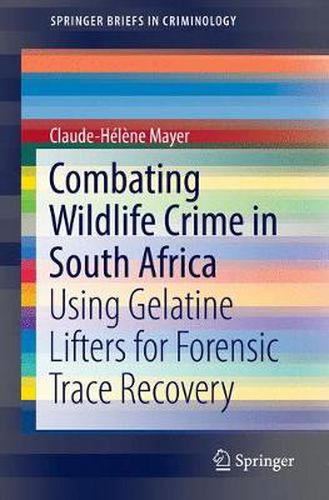Readings Newsletter
Become a Readings Member to make your shopping experience even easier.
Sign in or sign up for free!
You’re not far away from qualifying for FREE standard shipping within Australia
You’ve qualified for FREE standard shipping within Australia
The cart is loading…






This title is printed to order. This book may have been self-published. If so, we cannot guarantee the quality of the content. In the main most books will have gone through the editing process however some may not. We therefore suggest that you be aware of this before ordering this book. If in doubt check either the author or publisher’s details as we are unable to accept any returns unless they are faulty. Please contact us if you have any questions.
This brief explores wildlife crime and its international and culture-specific combat in South Africa from a green psychology perspective, focusing on a specific method of forensic trace recovery by analysing and evaluating the use of gelatine lifters.
It provides theoretical and applied insight into visualising and sequential processing of finger-, shoe- and footprints, and environmental traces. It allows the reader in-depth insight into effective methods of international wildlife crime combat, based on the South African perspective. This brief gives theoretical and applied recommendations for international, regional and local actors for successful cooperation on wildlife protection.
As global and local programs, actions and law enforcement strategies to combat wildlife crime are gaining strength, forensic trace evidence is a useful method for investigative and preventive success. This brief will be useful for students and researchers in forensic science, wildlife crime, green criminology, as well as for law enforcement and international actors combating wildlife crime practically on both international and local levels.
$9.00 standard shipping within Australia
FREE standard shipping within Australia for orders over $100.00
Express & International shipping calculated at checkout
This title is printed to order. This book may have been self-published. If so, we cannot guarantee the quality of the content. In the main most books will have gone through the editing process however some may not. We therefore suggest that you be aware of this before ordering this book. If in doubt check either the author or publisher’s details as we are unable to accept any returns unless they are faulty. Please contact us if you have any questions.
This brief explores wildlife crime and its international and culture-specific combat in South Africa from a green psychology perspective, focusing on a specific method of forensic trace recovery by analysing and evaluating the use of gelatine lifters.
It provides theoretical and applied insight into visualising and sequential processing of finger-, shoe- and footprints, and environmental traces. It allows the reader in-depth insight into effective methods of international wildlife crime combat, based on the South African perspective. This brief gives theoretical and applied recommendations for international, regional and local actors for successful cooperation on wildlife protection.
As global and local programs, actions and law enforcement strategies to combat wildlife crime are gaining strength, forensic trace evidence is a useful method for investigative and preventive success. This brief will be useful for students and researchers in forensic science, wildlife crime, green criminology, as well as for law enforcement and international actors combating wildlife crime practically on both international and local levels.